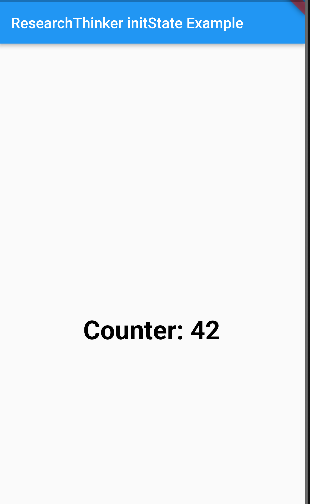initState in Flutter
Flutter Tutorial
Install Flutter in Win/Linux/Mac
Flutter Widgets:
Bottom Navigation Bar in Flutter
Auto Close Keyboard in Flutter
Screen size handling in Flutter
Flutter REST API
Flutter Advance
Wrap vs Builder vs OverBarFlow
Circular progress contain Icon
Flutter State management Comparison
Flutter Database
Flutter Token Expired Handling
Flutter Provider
Flutter GetX
Flutter with Native
Flutter Tips
Interview Questions
In Flutter, initState is a inital / beginning method of StatefulWidget.
“This method is invoked only once during the widget’s lifecycle”, It execute when page open or screen load. It means when you open StatefulWidget based screen there is initial value allocation to variables or method calling, whatever we mentioned inside initState method first allocated values and then the screen opens.
@override
void initState() { // initState
//Calling superclass (State)
super.initState();
// Initialization counter value 42
counter = 42;
print('initState called');
//method Calling at initial level
testMethod();
}
It’s a common practice to call super.initState() within this method to ensure that the initialization of the state is properly handled by the superclass (State) or parent class

Code:
import 'package:flutter/material.dart';
void main() {
runApp(MyApp());
}
class MyApp extends StatelessWidget {
@override
Widget build(BuildContext context) {
return MaterialApp(
home: MyStatefulWidget(),
);
}
}
class MyStatefulWidget extends StatefulWidget {
@override
_MyStatefulWidgetState createState() => _MyStatefulWidgetState();
}
class _MyStatefulWidgetState extends State<MyStatefulWidget> {
// Declare variable
int counter = 0;
@override
void initState() {
//Calling superclass (State)
super.initState();
// Initialization counter value 42
counter = 42;
print('initState called');
}
@override
Widget build(BuildContext context) {
return Scaffold(
appBar: AppBar(
title: Text('ResearchThinker initState Example'),
),
body: Center(
//Counter value will be 42 because we mentioned 42 inside init State
child: Text('Counter: $counter',style: TextStyle(fontSize:35,fontWeight:FontWeight.bold,
color: Colors.black),),
),
);
}
}
Similarly, if we use variables in the build method of a Stateful widget, and the values of those variables depend on an API or specific methods, we declare the API function or method inside initState. This ensures that the API or specific method loads first, followed by the build method.
In this example we are using method which execute first and then build state
import 'package:flutter/material.dart';
class MyStatefulWidget extends StatefulWidget {
@override
_MyStatefulWidgetState createState() => _MyStatefulWidgetState();
}
class _MyStatefulWidgetState extends State<MyStatefulWidget> {
// Declare a variable
int counter = 0;
@override
void initState() {
super.initState();
// Initialize counter value
incrementCounter(21);
print('initState called with counter: $counter');
}
// Simple method to add value to the counter
void incrementCounter(int value) {
setState(() {
counter=value+value;
});
}
@override
Widget build(BuildContext context) {
return Scaffold(
appBar: AppBar(
title: Text('ResearchThinker Counter Example'),
),
body: Center(
child: Column(
mainAxisAlignment: MainAxisAlignment.center,
children: [
/// Here counter value will 42 due to increment function execute in intiState
Text(
'Counter: $counter',
style: TextStyle(fontSize: 35, fontWeight: FontWeight.bold, color: Colors.black),
),
SizedBox(height: 20),
],
),
),
);
}
}



